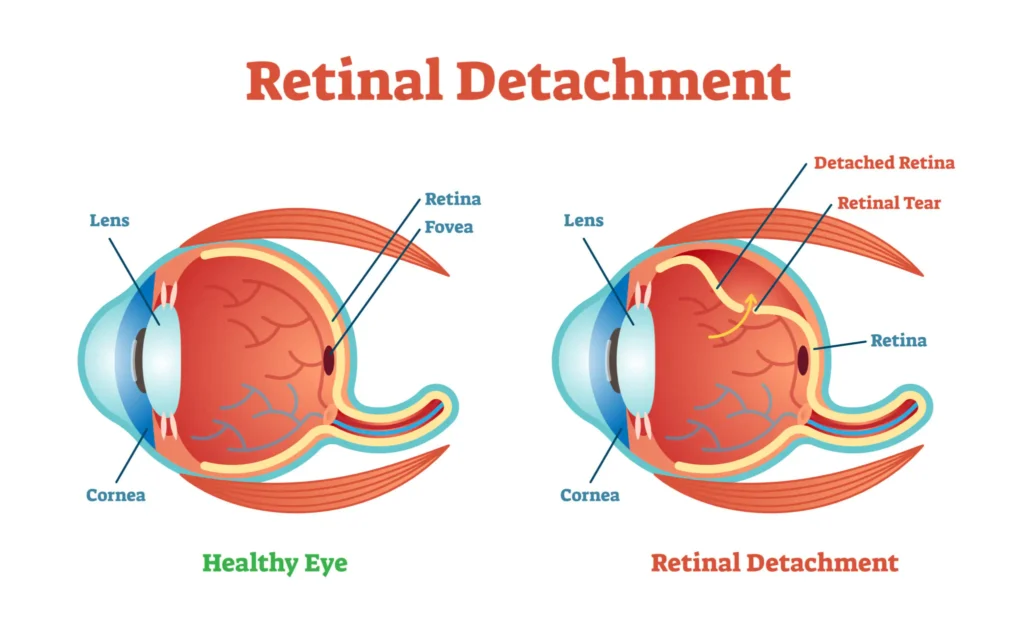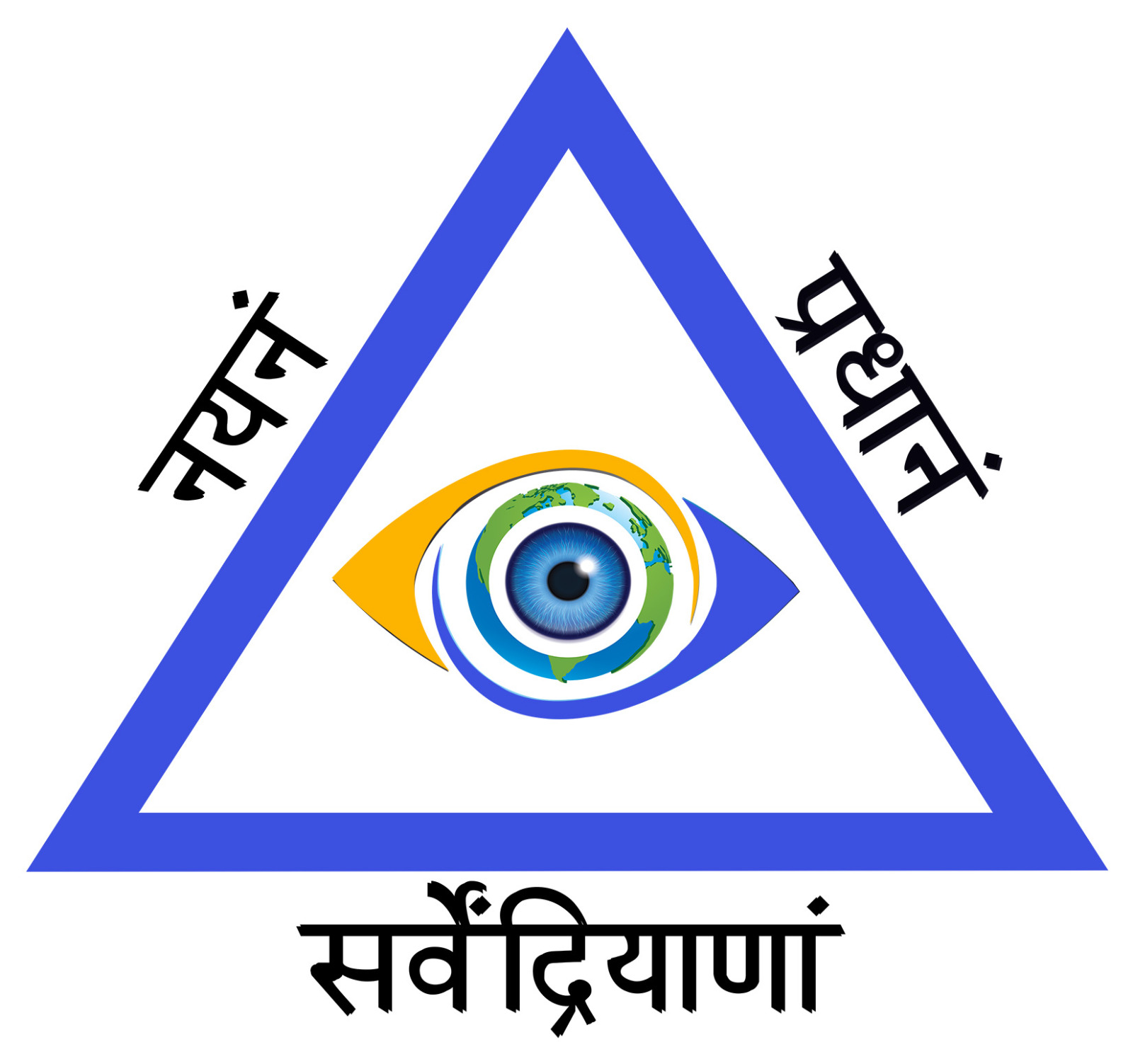Our vision is one of the most important senses, and protecting it requires proactive care. Retinal detachment treatment in Gachibowli, Hyderabad, is essential for those experiencing vision-related emergencies. Retinal detachment is a medical emergency that, if left untreated, can lead to permanent vision loss. Fortunately, with the expertise of Dr. Ramyashri, one of the leading ophthalmologists in Gachibowli, Hyderabad, patients have access to state-of-the-art diagnosis and treatment options to protect and restore their vision.
What is Retinal Detachment?
The retina is a thin layer of light-sensitive tissue located at the back of the eye. It captures light and sends visual signals to the brain through the optic nerve, enabling us to see. Retinal detachment occurs when this crucial tissue separates from its normal position, cutting off its blood supply and oxygen.
Without immediate treatment, retinal detachment can cause irreversible damage and total vision loss. Early detection is critical, and seeking help from a skilled ophthalmologist as soon as symptoms appear is essential to preserving sight.
Types of Retinal Detachment
Understanding the different types of retinal detachment helps in early diagnosis and targeted treatment:
Rhegmatogenous Retinal Detachment
This is the most common type, caused by a tear or hole in the retina. When the vitreous gel in the eye leaks through the tear, it lifts the retina from its normal position.
- Causes: Aging, trauma, severe nearsightedness, or previous eye surgery.
- Symptoms: Flashes of light, sudden floaters, and a shadow or curtain effect over the field of vision.
Tractional Retinal Detachment
This type occurs when scar tissue on the retina’s surface pulls it away from the back of the eye. It is often associated with diabetic retinopathy.
- Causes: Long-term diabetes, eye injury, or chronic inflammation.
- Symptoms: Gradual vision loss and distorted vision.
Exudative Retinal Detachment
Unlike the other types, this form occurs without a tear. It results from fluid accumulation beneath the retina due to inflammation, tumors, or vascular abnormalities.
- Causes: Inflammatory diseases, tumors, or age-related macular degeneration.
- Symptoms: Blurred vision and blind spots.
Symptoms of Retinal Detachment
Retinal detachment is painless, but its symptoms can be alarming. Recognizing the signs early can save your vision. If you experience any of the following, seek retinal detachment treatment in Gachibowli, Hyderabad, immediately:
- Sudden appearance of floaters (black spots or cobweb-like shapes).
- Flashes of light, especially in peripheral vision.
- A shadow or curtain-like effect across part of your visual field.
- Blurred, distorted, or reduced vision.
- Loss of peripheral (side) vision.
Diagnosis of Retinal Detachment
- A thorough examination is crucial for accurate diagnosis. The following methods are used to assess retinal detachment:
- Dilated Eye Examination: Provides a detailed view of the retina to detect tears or holes.
- Optical Coherence Tomography (OCT): Offers high-resolution images of the retina for precise diagnosis.
- Ultrasound Imaging: Used when clouding or other factors hinder direct visualization of the retina.

Treatment Options for Retinal Detachment
The treatment for retinal detachment depends on its type and severity. Dr. Ramyashri offers cutting-edge solutions tailored to each patient’s needs:
Laser Photocoagulation
- Best for: Small retinal tears or holes.
- How it works: A laser creates small burns around the tear to seal the retina and prevent fluid from passing underneath.
Cryopexy (Freezing Treatment)
- Best for: Minor retinal tears.
- How it works: A freezing probe is applied to the affected area, causing scar tissue to form and secure the retina.
Pneumatic Retinopexy
- Best for: Detachments with a single small tear.
- How it works: A gas bubble is injected into the eye, pushing the retina back into place. Laser or cryopexy may follow to secure the attachment.
Vitrectomy
- Best for: Severe or complex detachments.
- How it works: The vitreous gel pulling on the retina is removed and replaced with a saline solution, gas, or silicone oil.
Scleral Buckling
- Best for: Extensive detachments.
- How it works: A silicone band is placed around the eye to counteract the forces pulling the retina away from the back wall.
Why Retinal Detachment is a Medical Emergency
Retinal detachment progresses quickly and can lead to permanent blindness if untreated. Immediate intervention can prevent further damage and preserve vision. Retinal detachment treatment in Gachibowli, Hyderabad should be sought as soon as possible to maximize the chances of successful treatment.
Benefits of Regular Eye Check-ups
Regular eye check-ups are vital for maintaining good vision and detecting issues early, including retinal problems that may lead to detachment. These check-ups can help:
- Early Detection: Identifying retinal problems before symptoms worsen.
- Chronic Disease Management: Monitoring conditions like diabetes and high blood pressure to prevent eye complications.
- Improved Vision Health: Ensuring optimal vision and eye care for long-term health.
Preventing Retinal Detachment
While not all cases can be prevented, you can reduce your risk by:
- Managing chronic conditions like diabetes and high blood pressure.
- Protecting your eyes from injuries during sports or high-risk activities.
- Scheduling regular eye check-ups with a trusted ophthalmologist to detect early signs of retinal issues
Book an Appointment Today
Retinal detachment is a medical emergency. Early detection and prompt treatment are crucial to preserving your vision. If you or a loved one experiences any symptoms, don’t delay… Contact Dr. Ramyashri in Gachibowli, Hyderabad, today.
Protect your vision by staying proactive about your eye health. Regular check-ups and timely care can make all the difference.
